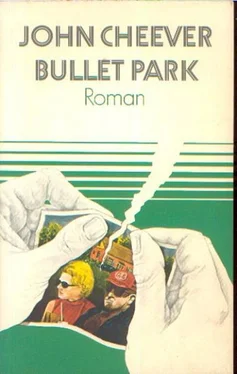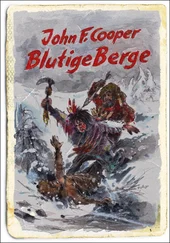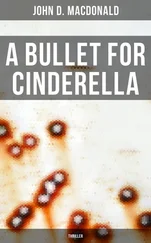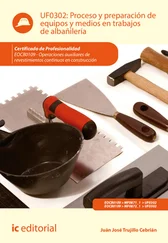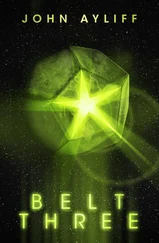"Well this got me off-guard. It really spilled me. The idea had never crossed my mind. The first thing I figured out was that I mustn't lose my temper. I must be reasonable and patient and so forth. He was only seventeen. I worked out a reasonable and a patient character like a character in a play. Then I tried to act the part. What it really felt like was that patience was this big woolly blanket and I was wrapping myself up in it but it kept slipping. So I said very patiently, 'Why, Tony?" and he said because he wasn't learning anything. He said that French was all grief and English was even worse because he read more than the teacher. Then he said that astronomy was just a gut course and that his teacher was senile. He said that whenever the teacher turned off the lights for a film strip everybody took naps and threw spitballs and that once the teacher cried when they piled out of the class in the middle of a sentence. He said that when he got to the door he looked back and saw the teacher crying. So he went up to him and explained that they didn't mean to be rude, they just didn't want to be late for the next class, and then he said that the teacher said that nobody understood him, that he loved his students, he loved them all. Then Tony said he didn't think too much of a teacher who cried. Well, then we played the fifth hole where you have to get your ball through a gate. I did this in par but he was three over and we went on talking. I said that he had to get his diploma. I asked him what he was planning to do without a diploma and he said he thought he might do some social work in the slums. He said there was this place for children with disturbed parents and he thought he might work there. Well, I was having trouble with my patience, my woolly blanket. It kept slipping. I said that if he wanted to do social work that was all right with me and I felt sure it would be all right with his mother but first he had to get his diploma. I said I guessed that social work like everything else needed training and preparation and that after he got his diploma I and his mother would be happy to send him on to some college where he could get training as a social worker. So then he said he couldn't see what was the good of a diploma if he wasn't learning anything. He said it was just a phony, just a phony scrap of paper like a phony treaty. Then I said that phony or not you had to observe some of the rules of the game. I said that trousers, for instance, weren't perhaps the most comfortable form of clothing but it was one of the rules of the game that you wear trousers. I asked him what would happen if I went to the train bare-ass and he said he didn't care if I went to the train bare-ass. He said I could go to the train bare-ass as far as he was concerned. By this time we'd stopped playing and that was when these other men, men or boys, asked if they could play through and we said yes and stood aside.
It was windy, as I say, and there was more thunder and it looked like rain and the light on the course was failing so you really couldn't see the faces of the men who played through. They were high school kids, I guess, slum kids, hoods, whatever, wearing tight pants and trick shirts and hair grease. They had spooky voices, they seemed to pitch them in a way that made them sound spooky, and when one of them was addressing the ball another gave him a big goose and he backed right into it, making groaning noises. It isn't that I dislike boys like that really, it's just that they mystify me, they frighten me because I don't know where they come from and I don't know where they're going and if you don't know anything about people it's like a terrible kind of darkness. I'm not afraid of the dark but there are some kinds of human ignorance that frighten me. When I feel this I've noticed that if I can look into the face of the stranger and get some clue to the kind of person he is I feel better but, as I say, it was getting dark and you couldn't see the faces of any of these strangers as they played through. So they played through and we went on talking about his diploma and the rules of the game. I said that whatever he wanted to do he had to train himself for it, he had to prepare himself. I said that even if he wanted to be a poet he had to prepare himself to be a poet. So then I said to him what I've never said before. I said: 'I love you, Tony.'
"So then he said, The only reason you love me, the only reason you think you love me is because you can give me things.' Then I said this wasn't true, that the only reason I was a generous father was because my own father hadn't given me very much. I said that because my own father had been so tight was why I wanted to be generous. So then he said: 'Generous, generous, generous, generous.' He said he knew I was very generous. He said that he heard about how generous I was practically every day in the year. So then he said, 'Maybe I don't want to get married. I wouldn't be the first man in the world who didn't want to get married, would I? Maybe I'm queer. Maybe I want to live with some nice, clean faggot. Maybe I want to be promiscuous and screw hundreds and hundreds of women. There are other ways of doing it besides being joined in holy matrimony and filling up the cradle. If having babies is so great why did you only have one? Why just one?" I told him then that his mother had nearly died when he was born. 'I'm sorry,' he said. 1 didn't know that.' So then he said that I had got to understand that he might not want to come home at dusk to a pretty woman and play softball with a bunch of straight-limbed sons. He said he might want to be a thief or a saint or a drunkard or a garbage man or a gas pumper or a traffic cop or a hermit. Then I lost my patience, my woolly blanket, and said that he had to get off his ass and do something useful and he said: "What? Like pushing mouthwash.' Then I lifted up my putter and I would have split his skull in two but he ducked and threw down his club and ran off the links into the dark.
"So there I was on this ruined miniature golf course having practically murdered my son but what I wanted to do then was to chase after him and take another crack at him with the putter. I was very angry. I couldn't understand how my only son, whom I love more than anything in the world, could make me want to kill him. So then I picked up his putter and walked back to the car. When I got home I told Nellie that I'd had a fight with Tony but she sympathized with him, of course, because I'd already had a fight with her. Then I had a drink and looked at television-there wasn't anything else to do. I sat there in front of the set until about midnight when he came in. He didn't speak to me and I didn't speak to him. He went upstairs to bed and I went up a little later.
"He's been in bed ever since."
When Tony had been in bed twenty-two days Nellie received a letter from a cleaning woman named Mary Ashton who had once worked for her. Mary had been intelligent and industrious but she had been a thief. She had first stolen two small diamond rings that had belonged to Nellie's mother. Nellie never wore the rings and she did not accuse the maid of the theft. Good cleaning women were hard to find, Mary was poor and deserving, and Nellie thought of the diamonds as a bonus. A month or so later a pair of gold cufflinks vanished and Nellie fired the maid. She did not mention the cufflinks. The letter she received was neatly typed (had she stolen the typewriter?) on good stationery (stolen?). The letter read: "Dear Mrs. Nailles: I know that your son is sick and I am very sorry to hear this. He is one of the nicest boys I have ever known. In the village there is a guru or faith-healer who calls himself Swami Rutuola. He cured my sister of arthritis last year. He works part time for Percham, the carpenter, but he's usually at home in the afternoons. He doesn't have any telephone but he lives upstairs over Peyton's funeral parlor on Hill Street."
Читать дальше
